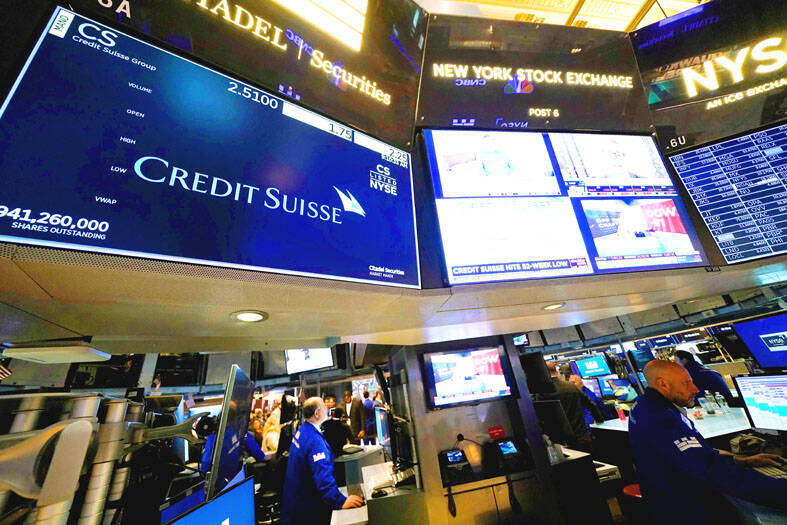Wall Street on Friday closed lower, marking the end of a tumultuous week dominated by an unfolding crisis in the banking sector and the gathering storm clouds of possible recession.
All three major indices ended the session deep in negative territory, with financial stocks down the most among the major sectors of the S&P 500.
For the week, while the benchmark S&P 500 and the NASDAQ closed higher than their previous Friday results, up 1.43 percent and 4.41 percent respectively, the Dow Jones Industrial Average posted a weekly decline of 0.15 percent.

SVB Financial Group announced it would seek Chapter 11 bankruptcy protection, the latest development in an ongoing drama that began last week with the collapse of Silicon Valley Bank and Signature Bank, which sparked fears of contagion throughout the global banking system.
The sell-off “is a bit of an overreaction,” said Oliver Pursche, senior vice president at Wealthspire Advisors in New York. “However, there is validity to some of the concerns regarding overall liquidity and a potential liquidity crunch.”
Those concerns have spread to Europe, as Credit Suisse Group AG shares stumbled over liquidity worries, prompting policymakers to scramble to reassure markets.

Photo: AFP
“This goes a lot further than just a run on SVB or First Republic, it goes to the real impact these interest rate hikes are having on capital and balance sheets,” Pursche said. “And you’re seeing it impact large institutions like Credit Suisse, and that’s got people rattled.”
Over the past two weeks, the S&P Banking Index and the KBW NASDAQ Regional Banking Index plunged by 4.6 percent and 5.4 percent respectively, their largest two-week drops since March 2020.
First Republic Bank plummeted 32.8 percent after the bank announced it was suspending its dividend, reversing Thursday’s surge, which was sparked by an unprecedented US$30 billion rescue package from large financial institutions
Among First Republic’s peers, PacWest Bancorp fell 19 percent, while Western Alliance slid 15.1 percent.
US-traded shares of Credit Suisse also closed sharply lower, down 6.9 percent.
Investors now turn their gaze to the US Federal Reserve’s two-day monetary policy meeting next week.
In view of recent developments in the banking sector and data suggesting a softening economy, investors have adjusted their expectations regarding the size and duration of the Fed’s restrictive interest rate hikes.
“This mini banking crisis has increased the chance of recession and accelerated the slowdown timeline for the economy,” Pursche said. “It’s natural that the Fed should re-examine its course of action, but it’s still very clear that while inflation is slowing, it’s still very much a concern and needs to be brought under control.”
At last glance, financial markets have priced in a 60.5 percent likelihood that the central bank will raise its key target rate by 25 basis points, and a 39.5 percent probability that it will let the current rate stand, CME Group Inc’s FedWatch tool showed.
The Dow Jones fell 384.57 points, or 1.19 percent, to 31,861.98, the S&P 500 lost 43.64 points, or 1.10 percent, to 3,916.64 and the NASDAQ Composite dropped 86.76 points, or 0.74 percent, to 11,630.51.

Merida Industry Co (美利達) has seen signs of recovery in the US and European markets this year, as customers are gradually depleting their inventories, the bicycle maker told shareholders yesterday. Given robust growth in new orders at its Taiwanese factory, coupled with its subsidiaries’ improving performance, Merida said it remains confident about the bicycle market’s prospects and expects steady growth in its core business this year. CAUTION ON CHINA However, the company must handle the Chinese market with great caution, as sales of road bikes there have declined significantly, affecting its revenue and profitability, Merida said in a statement, adding that it would

i Gasoline and diesel prices at fuel stations are this week to rise NT$0.1 per liter, as tensions in the Middle East pushed crude oil prices higher last week, CPC Corp, Taiwan (台灣中油) and Formosa Petrochemical Corp (台塑石化) said yesterday. International crude oil prices last week rose for the third consecutive week due to an escalating conflict between Israel and Iran, as the market is concerned that the situation in the Middle East might affect crude oil supply, CPC and Formosa said in separate statements. Front-month Brent crude oil futures — the international oil benchmark — rose 3.75 percent to settle at US$77.01

RISING: Strong exports, and life insurance companies’ efforts to manage currency risks indicates the NT dollar would eventually pass the 29 level, an expert said The New Taiwan dollar yesterday rallied to its strongest in three years amid inflows to the nation’s stock market and broad-based weakness in the US dollar. Exporter sales of the US currency and a repatriation of funds from local asset managers also played a role, said two traders, who asked not to be identified as they were not authorized to speak publicly. State-owned banks were seen buying the greenback yesterday, but only at a moderate scale, the traders said. The local currency gained 0.77 percent, outperforming almost all of its Asian peers, to close at NT$29.165 per US dollar in Taipei trading yesterday. The

RECORD LOW: Global firms’ increased inventories, tariff disputes not yet impacting Taiwan and new graduates not yet entering the market contributed to the decrease Taiwan’s unemployment rate last month dropped to 3.3 percent, the lowest for the month in 25 years, as strong exports and resilient domestic demand boosted hiring across various sectors, the Directorate-General of Budget, Accounting and Statistics (DGBAS) said yesterday. After seasonal adjustments, the jobless rate eased to 3.34 percent, the best performance in 24 years, suggesting a stable labor market, although a mild increase is expected with the graduation season from this month through August, the statistics agency said. “Potential shocks from tariff disputes between the US and China have yet to affect Taiwan’s job market,” Census Department Deputy Director Tan Wen-ling